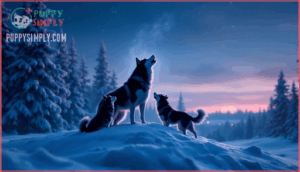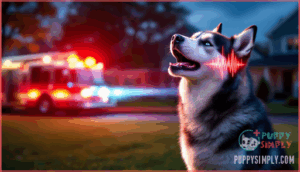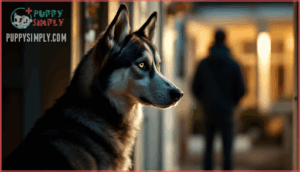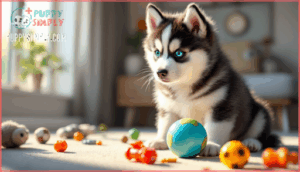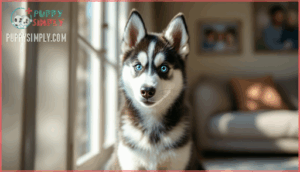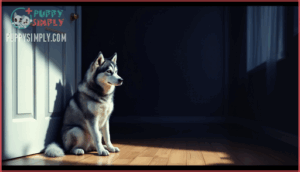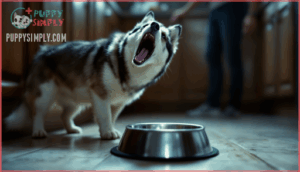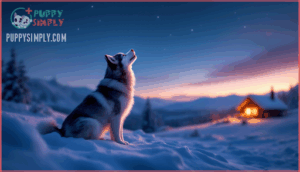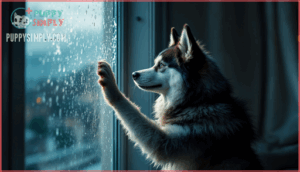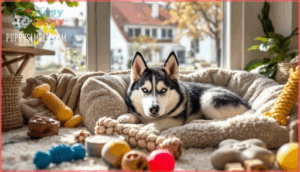This site is supported by our readers. We may earn a commission, at no cost to you, if you purchase through links.
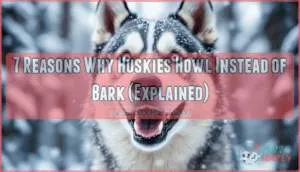
This difference shaped how they interact with their environment and their pack—whether that’s other dogs, wildlife, or you. Understanding why huskies howl instead of bark reveals something fundamental about their nature, and it can help you interpret what your dog is actually trying to tell you.
Table Of Contents
- Key Takeaways
- Why Do Huskies Howl Instead of Bark?
- Top 7 Reasons Huskies Howl
- Howling as a Form of Communication
- Health and Environmental Triggers for Howling
- Managing and Reducing Excessive Howling
- Frequently Asked Questions (FAQs)
- At what age do husky puppies start howling?
- Can I train my husky not to howl as much?
- Why does my husky howl more at night?
- Is it normal for some huskies not to howl very much?
- What are some tricks to getting my husky to howl on command?
- Can huskies learn to bark more like other dog breeds?
- At what age do huskies typically start howling?
- Is excessive howling a sign of aggression in huskies?
- How can I tell if my huskys howling indicates a medical problem?
- Do all huskies howl equally, or do some howl more than others?
- Conclusion
Key Takeaways
- Huskies howl instead of bark because they retain wolf ancestry traits, using lower-frequency vocalizations for long-distance communication across vast territories where barking would be ineffective.
- The seven primary triggers for husky howling are responding to other dogs’ howls, reacting to sirens and high-pitched sounds, alerting owners to threats, expressing boredom, seeking attention, experiencing anxiety or loneliness, and indicating hunger or physical discomfort.
- Excessive howling can signal underlying health issues like hip dysplasia, eye problems, or dental disease, so veterinary evaluation should come before assuming the behavior is purely communicative or attention-seeking.
- Managing excessive howling requires a combination of at least two hours of daily vigorous exercise, positive reinforcement training that rewards quiet behavior, environmental trigger reduction, and consistent routines to minimize stress and anxiety.
Why Do Huskies Howl Instead of Bark?
If you’ve ever wondered why your husky sounds more like a wolf than a typical dog, you’re not alone. The answer lies deep in their ancestry, breed traits, and how they’ve evolved to communicate with their pack.
Let’s break down what makes huskies choose howling over barking.
The Wolf Ancestry Behind Howling
At the heart of every husky’s howl lies a direct connection to wolf ancestors. Genetic proximity to wolves explains why huskies retain this ancestral instinct, unlike breeds shaped by domestication’s impact. Their pack mentality drives communication patterns rooted in wolf behavior, where howling served essential functions across vast territories. Huskies’ vocalizations are often triggered by environmental stimuli, such as sirens or high-pitched sounds.
- Ancient husky breed origins preserved acoustic features similar to wolf howls, including frequency modulation and duration
- Subspecies distinctions show that breeds genetically closer to wolves display more pronounced howling tendencies
- The ancestral function of howling enabled wolves to coordinate pack members over distances up to 10 kilometers
- Domestication reduced howling in most breeds, but huskies maintained this wolf-like trait due to their working history in Arctic environments
Breed-Specific Communication Methods
Beyond their wolf heritage, huskies have evolved breed-specific communication methods that set them apart from other dogs. Over 90% of husky owners report their dogs use a mix of howling, whining, and "talking" sounds rather than typical barking. This vocal diversity aids pack cohesion during activities and strengthens human interaction through speech-mimicking sounds. As a result, they often use howling for communication instead of barking.
Your husky’s canine communication includes sensory cues paired with body language—ear position, tail carriage, and facial expressions accompany roughly 70% of their vocalizations, creating a rich system of husky communication methods.
| Communication Element | Frequency of Use | Primary Function |
|---|---|---|
| Howls and "woo-woos" | 75% of vocalizations | Long-distance alerts, pack coordination |
| Whines and yelps | 65% in new situations | Expressing desire or frustration |
| Body language pairing | 70% of vocal events | Enhancing message clarity |
| Mimicry of human speech | 50% in trials | Responding to direct address |
| Context-based intensity shifts | 55% increase with change | Adapting to environmental triggers |
This breed-specific behavior reflects huskies’ working origins, where efficient communication ensured team success across Arctic distances up to 10 miles.
Differences Between Howling and Barking
Understanding the structural contrasts helps explain why your husky vocalizes differently. Howling and barking differ in three fundamental ways:
- Acoustic Properties: Howling lasts 1.4 to 7 seconds at lower frequencies (300–1000 Hz) with a stable tone, while barking bursts last just 0.1 to 0.5 seconds at higher frequencies (1000–2000 Hz) with rapid pitch changes.
- Communication Context: Howling signals social cohesion and long-distance contact—40% of dogs howl to sirens or other howls—whereas barking provides immediate alerts, with 62% of owners noting it’s used for warning.
- Evolutionary Origins: Howling reflects primitive canine communication retained from wolves, while selective breeding increased domestic dog barking frequency by an estimated 35-fold, especially in recently developed breeds.
These vocalization patterns stem from your husky’s genetic makeup. Breeds with ancient lineage show 34% higher howling responsiveness, and emotional triggers play distinct roles—dogs in isolation are 27% more likely to howl than bark when seeking to reestablish contact.
Top 7 Reasons Huskies Howl
Now that you understand the wolf-like roots of your husky’s vocal habits, let’s look at the specific situations that trigger those unmistakable howls.
Here are seven common reasons your husky breaks into song instead of a typical bark.
Responding to Other Dogs’ Howls
This mimicking howls behavior reflects pack mentality and canine communication patterns, where huskies use distance communication to stay connected.
Your husky’s howling response might seem like competitive howling, but it’s actually learned behavior that strengthens husky pack behavior.
These husky communication methods help them coordinate with other dogs, even when separated by considerable distances, making husky howling behavior a natural social tool.
Reacting to Noises and Sirens
High-pitched sirens racing down your street can turn your husky into an instant vocal soloist, but this isn’t just random noise—it’s deeply rooted in ancestral instinct. Your dog’s siren sensitivity stems from high-pitched noises resembling pack howls, triggering mimicking sounds as environmental sounds activate innate responses.
Understanding trigger identification helps you apply calming techniques, reducing noise aversion when husky reactions to noise occur through sound association with their wolf heritage.
Alerting Owners to Potential Threats
Your husky’s howl at the sight of a stranger at the door isn’t just noise—it’s their way of sounding the alarm and keeping you informed of potential threats in their territory. This alerting behavior reflects pack protection instincts, where intruder identification triggers an instinctual response.
Your dog’s territorial defense kicks in when they sense danger, using howls as danger signals to warn you about potential intruders approaching your home.
Expressing Boredom or Desire to Play
Sometimes, a husky’s howl isn’t about danger or fear—it’s simply their way of saying they’re bored out of their mind and ready for some action. Play Deprivation and lack of Mental Enrichment drive this vocal behavior, signaling their need for Boredom Relief through engagement.
Husky boredom and stimulation requirements include:
- Daily Interactive Games that challenge problem-solving skills
- Regular Social Playtime with other dogs or family members
- Varied activities providing consistent mental stimulation
When your husky howls from boredom, they’re basically requesting play and meaningful interaction to satisfy their high-energy nature.
Seeking Attention From Family Members
As a social breed that thrives on connection, your husky may howl to capture your attention when they feel ignored or want interaction with their favorite humans. This attention-seeking behavior often appears as playtime howling or affection howling, a form of verbal manipulation where your husky learns that howling brings family interaction.
Understanding husky attention-seeking patterns helps with attention training and knowing when ignoring howling might be appropriate.
Experiencing Anxiety or Loneliness
When left alone, huskies often experience separation anxiety and emotional distress, leading to persistent howling that signals their discomfort. Separation triggers like routine changes or social isolation activate canine anxiety responses, as these pack-oriented dogs struggle with loneliness.
Recognizing husky separation anxiety symptoms helps you implement comfort measures—gradual departures, safe spaces, or calming aids—to ease their stress and reduce vocalization.
Indicating Hunger or Discomfort
If your husky’s howling suddenly ramps up around mealtimes or seems tied to physical discomfort, hunger or an underlying health issue might be the culprit. Hunger signals often manifest as persistent vocalizations near feeding times, while pain indicators from health problems like hip dysplasia or eye issues can trigger distress howling.
Monitor your husky’s dietary needs and discomfort levels closely, as excessive husky attention seeking through howling warrants a veterinary checkup to rule out underlying health correlations.
Howling as a Form of Communication
Your husky’s howl isn’t just noise—it’s a conversation. These vocal dogs use howling to send clear messages to their pack, whether that’s you, other dogs, or even distant sounds they’re responding to.
Your husky’s howl is an ancient conversation—a way to send clear messages to their pack, whether you, other dogs, or the world itself
Let’s break down what your husky might be trying to tell you through those distinctive vocalizations.
Communicating Over Long Distances
In the wild, wolves depend on howling to bridge vast stretches of terrain, and your husky carries that same ancient communication toolkit in their DNA. This long-distance announcement relies on sound propagation through environmental acoustics, allowing pack cohesion even when members are miles apart.
Your dog’s vocalization sends ancestral echoes across neighborhoods, maintaining communication links that once coordinated hunts and reinforced territorial claims in wilderness settings.
Marking Territory and Presence
Beyond broadcasting their location, your husky’s howl also functions as an audible boundary marker—a sonic flag planted in the neighborhood that declares their presence to any canines within earshot. This territorial behavior combines vocal boundaries with scent marking instincts, creating pack announcements that reinforce dominance displays.
Territory identification by howling helps your dog establish territorial defense without physical confrontation, letting other dogs know exactly where one pack ends and another begins through husky howling behavior.
Expressing Emotions and Needs
Your husky’s howls aren’t just territorial markers—they’re emotional broadcasts that communicate everything from excitement and happiness to fear, hunger, and physical discomfort. Through these vocal needs, your dog uses emotional expression to signal everything from seeking comfort during stressful moments to expressing joy when you arrive home.
This pack bonding mechanism allows emotional release and attention-seeking behavior, helping you understand exactly what your husky needs through their distinctive Husky emotional expression patterns that communicate far more than words ever could.
Inviting Play or Social Interaction
When your husky wants to hang out or kick off a game, you’ll often hear a signature howl that’s part invitation, part social announcement to anyone within earshot. This pack bonding ritual uses distinct social cues to spark play and interaction:
- Cooperative howling builds excitement before activities
- Play invitations often include interactive responses from other dogs
- These vocalizations strengthen socialization and communication
- Attention-seeking howls signal readiness for social interaction
Your husky’s vocal invitations reflect their deep need for connection and shared experiences.
Health and Environmental Triggers for Howling
While howling is a natural part of your husky’s personality, sometimes it signals something more serious. Physical discomfort, environmental changes, and stress can all trigger excessive vocalization that goes beyond normal communication. Here’s what you need to watch for.
Medical Issues Like Eye Problems or Hip Dysplasia
Sometimes pain speaks in a howl. Huskies experiencing discomfort from eye problems or hip dysplasia may vocalize differently than usual. Cataract prevalence has risen to 6% in recent years, while genetic predisposition makes vision impairment a real concern—though surgical intervention often restores sight. Hip dysplasia affects only 2.2% of the breed, but injury or other health problems warrant veterinary care.
| Health Issue | Impact on Husky Health |
|---|---|
| Eye Problems | Vision impairment, behavioral changes |
| Hip Dysplasia | Mobility issues, pain-related howling |
| Genetic Conditions | Require ongoing veterinary care |
Changes in Routine or Environment
Disruptions to your husky’s daily rhythm—whether from a new home, a shift in your work schedule, or even a rearranged living space—can turn their world upside down and trigger persistent howling.
Travel anxiety and schedule shifts disrupt behavioral traits tied to routine, while loss, grief, or new pets introduce stress.
These environmental factors increase anxiety and boredom, prompting your husky to vocalize distress until stability returns.
Sensitivity to Loud or Unfamiliar Sounds
Loud sounds—from wailing sirens to sudden vacuum cleaner roars—can jolt your husky’s sensitive hearing and spark an instinctive howling response rooted in their wolf heritage. High-pitched noises trigger particular anxiety because they mimic distress calls your dog’s ancestors used to communicate danger.
Identifying specific environmental stimuli that prompt howling helps you intervene. Desensitization methods, like gradually exposing your husky to recorded sounds at low volumes paired with treats, can reduce noise anxiety over time. Environmental enrichment—such as white noise machines or calming music—provides a buffer against sudden triggers.
Separation Anxiety and Stress
Separation from family members can trigger significant anxiety in huskies, causing stress hormones to surge and behavioral changes like excessive howling. This canine anxiety stems from your husky’s pack instinct—they’re social animals that bond deeply with their people.
Environmental enrichment before departures, calming techniques like puzzle toys, and gradual desensitization to your leaving routine help manage separation anxiety. Consistent daily schedules reduce anxiety triggers, while addressing stress through exercise prevents howling episodes rooted in distress rather than communication.
Managing and Reducing Excessive Howling
Now that you understand what triggers your husky’s howling, it’s time to address the behavior itself. Excessive howling isn’t something you’re stuck with—there are practical steps you can take to manage it.
Here’s what actually works to reduce howling and help your husky feel more settled.
Increasing Exercise and Mental Stimulation
A tired husky is a quiet husky, and that’s where a solid exercise routine becomes your secret weapon against excessive howling. Huskies have substantial exercise needs—aim for at least two hours daily of vigorous activity like running or fetch.
Beyond physical exercise, mental stimulation through puzzle toys and training games keeps their minds engaged and reduces boredom-driven howling. Rotate activities to maintain novelty, incorporating social enrichment with other dogs when possible.
This routine variety prevents the frustration that triggers vocalization. A well-exercised husky channels energy productively rather than through constant howling.
Training With Positive Reinforcement
Positive reinforcement is where you reward the quiet moments, not punish the noise—and this shift in strategy often produces the fastest results in reducing howling. When your husky stays silent, immediately mark that behavior with a clicker training signal, then reward with treats or praise.
This reward system teaches them that quiet earns positive consequences. Use consistent cues like "quiet" paired with rewards to shape behavior effectively.
Crucially, ignore howling entirely rather than giving attention through scolding, which paradoxically reinforces the vocalization. Over time, your husky learns silence is far more rewarding than noise.
Addressing Health Concerns
While training can teach your husky when to stay quiet, sometimes the howling persists because something physical is causing them pain or discomfort. Huskies have specific genetic predispositions to certain health issues that warrant veterinary attention:
- Hip Dysplasia — A common condition in huskies causing joint pain and mobility problems
- Eye Problems — Including cataracts or progressive retinal atrophy that create discomfort
- Ear Infections — Often overlooked but cause significant pain during eating or head movement
- Dental Disease — Tooth pain can trigger vocalization and behavioral changes
- Orthopedic Issues — Arthritis or spinal problems affecting movement and comfort
Pain management through vet visits is essential. A veterinarian can diagnose underlying husky health issues and recommend appropriate treatment, whether medication, physical therapy, or dietary adjustments. Once you address the physical discomfort, you’ll often notice howling decreases naturally. Don’t assume excessive vocalization is purely behavioral—rule out health concerns first.
Reducing Triggers and Stressors
Once you’ve ruled out medical issues, the next step is getting ahead of the situations that trigger your husky’s howling in the first place. Identify what sets off the behavior—whether it’s sirens, other dogs, or your departure—then work to reduce exposure when possible.
For separation anxiety specifically, practice short absences and create a calm departure routine.
Increase daily exercise and mental stimulation through puzzle toys and training sessions, as boredom drives many huskies to vocalize. Sound desensitization helps too: gradually expose your dog to triggering noises at lower volumes while rewarding quiet behavior.
Maintain consistent routines to minimize stress and anxiety, which stabilize your husky’s overall emotional state.
Consistency in Routine and Socialization
The foundation you’ve built through exercise, desensitization, and stress management won’t stick without the glue that holds it all together—and that glue is consistency paired with regular social exposure. Predictable schedules create security for your husky, reducing anxiety that fuels excessive vocalization.
Consistent training reinforces what you’ve taught, while routine socialization—exposing your dog to varied people, environments, and other dogs—builds confidence and lessens reactivity to triggers. When your husky knows what to expect and feels secure in social situations, howling diminishes naturally.
Frequently Asked Questions (FAQs)
At what age do husky puppies start howling?
As the saying goes, "you can’t teach an old dog new tricks"—but young pups are a different story. Husky puppies commonly begin howling between 4 to 8 weeks old, though individual puppy variation means some start earlier or later.
Early howling signs emerge as normal howling development progresses, influenced by genetics and social experiences. Your husky vocalizations and husky behavior reflect their pack heritage, with pups experimenting with communication as they grow.
Can I train my husky not to howl as much?
Yes, you can reduce howling through consistent training and management. Use positive reinforcement training to reward quiet behavior, increase daily exercise and mental stimulation, and apply gradual desensitization to triggers like sirens.
Establish routine consistency, practice alternative behaviors, and consider professional help from a canine behaviorist if needed. Rule out health issues first.
Why does my husky howl more at night?
Your husky likely howls more at night because darkness amplifies pack separation anxiety, environmental changes trigger nocturnal alertness, and altered sleep cycles increase vocalization.
Reduced nighttime stimulation combined with heightened sensitivity to distant sounds—sirens, wildlife—intensifies their ancestral communication instincts, making them vocal during quieter hours.
Is it normal for some huskies not to howl very much?
Not all huskies howl equally—breed variations and genetic predisposition mean some are naturally quieter.
Training influence, early socialization, and individual temperament shape howling alternatives.
Silent huskies aren’t unusual; some simply communicate differently through whining or body language, which is completely normal husky behavior.
What are some tricks to getting my husky to howl on command?
Your husky’s vocal cues are like musical notes waiting to be conducted. Start by using positive association—reward howling naturally with treats and praise.
Mimic sounds to trigger responses, then pair verbal command training with your reward system. Consistency transforms spontaneous vocals into on-command performances through positive reinforcement.
Can huskies learn to bark more like other dog breeds?
Your husky can learn to bark through positive reinforcement training, but breed limitations and genetic predisposition toward howling make barking less natural.
Their unique vocal cord anatomy favors howling for long-distance communication.
Consistent husky training tips using positive reinforcement training may increase barking, though howling remains their preferred vocalization.
At what age do huskies typically start howling?
It’s ironic that these vocal pups stay mostly silent as newborns. Husky puppies usually begin early howling signs around 3-4 weeks old, with pack influence and individual variation shaping their breed characteristics.
Most develop consistent husky puppy behavior by 8 weeks, though some start later depending on their environment and littermates’ influence.
Is excessive howling a sign of aggression in huskies?
No, excessive howling isn’t inherently a sign of aggression in huskies. Howling functions as communication and emotional expression rather than dominance displays.
However, resource guarding or fear-based howling coupled with defensive postures could indicate underlying anxiety or territorial behavior worth addressing through proper training and socialization.
How can I tell if my huskys howling indicates a medical problem?
Your husky’s howling might signal pain if behavior changes suddenly. Watch for physical symptoms like limping, reluctance to move, or sensitivity to touch.
Eye problems or hip dysplasia cause discomfort-related howling.
Vet examination is essential to rule out underlying conditions affecting your dog’s health.
Do all huskies howl equally, or do some howl more than others?
No, huskies don’t howl equally. Genetic predisposition, individual temperament, and environmental factors create significant variation.
Some huskies are naturally more vocal than others due to pack dynamics and training impact. Your husky’s breed-specific traits and personal history shape their vocalization patterns.
Conclusion
Your husky’s howl isn’t a flaw—it’s a window into ancient communication. The seven reasons why huskies howl instead of bark reveal a breed still connected to their wolf heritage, using vocalizations that travel farther and convey more nuance than barking ever could.
Whether responding to sirens, signaling distress, or simply seeking connection, each howl has a purpose rooted in their pack mentality. By recognizing these triggers, you’ll understand your dog’s needs better and respond with intention rather than frustration.
Embrace what makes huskies unique: their voice is their superpower.
- https://www.linkedin.com/in/amy-nicole-lewis-a62ba7185/?originalSubdomain=uk
- https://www.nature.com/articles/s42003-023-04450-9
- https://www.dogtrainermanhattan.com/why-do-dogs-howl-exploring-the-evolutionary-roots-of-dog-howling/
- https://pmc.ncbi.nlm.nih.gov/articles/PMC5804178/
- https://yellowstonian.org/the-secret-chorus-language-of-yellowstone-wolves/

